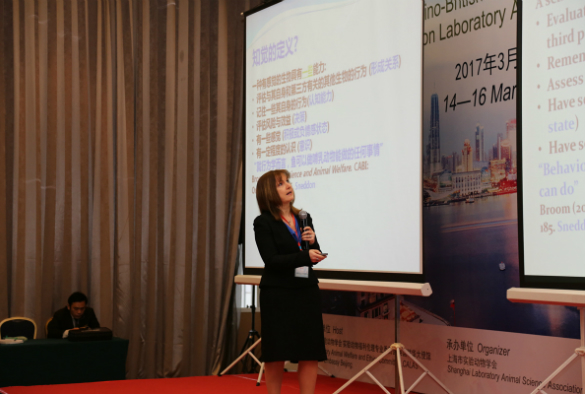Dr Lynne Sneddon from the University’s Institute of Integrative Biology recently attended the Sino-British Fourth International Seminar on Laboratory Animal Welfare and Ethics, 14-16th March 2017 in Shanghai.
“The drive for improving welfare in experimental animals has never been stronger as this ensures that any data collected is actually valid. My own research agenda has tackled questions addressing the welfare of fish in applied settings such as aquaculture, fisheries, the ornamental industry and the laboratory where fish are now the second most popular experimental model ahead of rats.
I was delighted to be invited by the UK government to speak at a meeting in Shanghai, China, on the subject of fish health and welfare focusing on the model species, the zebrafish. This is a particularly important time as the Chinese government along with the Chinese Association for Laboratory Animal Science (CALAS) are developing their experimental animal legislation and guidelines and so the chance to influence government and policy makers was a great opportunity. The theme of the meeting was “Good Welfare = Good Science” and represents current thinking that experimental animals need to be in peak health for the science to be meaningful.
The meeting was opened by the British Consul, John Edwards, in a UK sponsored reception where I had the chance to meet with other delegates. This allowed a useful networking opportunity where we discussed the many topics covered by the meeting, which was organised by Judy McArthur Clark CBE and the CEO of the Universities Federation for Animal Welfare (UFAW), Robert Hubrecht OBE. The formal sessions commenced the following morning with a wonderful speech by Alasdair Hamilton, Head of Science and Innovation at the British Embassy, who informed us this was a golden era for collaboration in science and education between the UK and China. The presentations that followed were inspired by ethical thinking and focussed upon good experimental design and ethics review procedures. The Chinese delegates passionately engaged with the experimental scenarios provided in a workshop to determine whether the science proposed did promote good welfare and embraced ethical principles. I was impressed at how the Chinese adopt a “Confuscian” view of the value of each animal – rather than the European take on this where only cephalopods (e.g. octopus) and mature adult vertebrates are protected under the law, their aim is to protect all animals equally. Other presentations given by Huw Gollege (UFAW) tackled good practice in euthanasia and how you can train animals to cooperate with experiments (Paul Finnemore, Astra Zeneca). My own talk where I addressed the questions of sentience, the capacity for pain, and how environmental and social enrichment improves wellbeing in laboratory zebrafish yielded many questions from the audience and has subsequently resulted in e-mails from Chinese and UK researchers asking for my opinion on their protocols.
In the evening we were treated to a Chinese banquet hosted by CALAS where the food was in plentiful supply and I tackled a major obstacle to eating – the use of chopsticks. The Chinese delegates introduced me to banquet etiquette and we went round each table toasting our fellow diners. “Ganbei” is our version of cheers and means “dry the cup” and was said many times during the meal. I also had some time to walk around Lake Malaren which is a beauty spot on the edge of Shanghai and it lived up to its reputation. I was fascinated by the amount of newlyweds having photographs taken in the pretty surrounds of the lake. There was no family present but two assistants ensuring the perfection of the main protagonists and a photographer taking some very arty shots of the blushing bride and groom. It was quite unlike the UK family photo approach. Overall, it was a great scientific meeting and I enjoyed the cultural differences that I experienced in China.”
